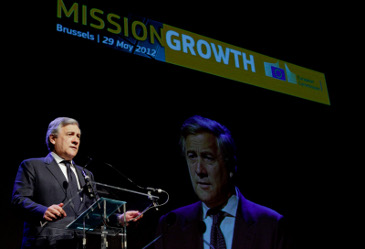Industry and Entrepreneurship
Missions for growth
Missions for growth - Helping SMEs go international

Nowadays, economic growth is concentrated in extra-EU markets. It is estimated that by 2020 70% of world growth will take place in emerging economies. But this is an opportunity for European companies, not a downside.
In order to seize this opportunity, EU companies must be able to compete in foreign markets. Big enterprises already do it. The real challenge is to allow EU Small and Medium-sized Enterprises to compete globally.
Too few EU SMEs operate beyond national borders. Only 25% have activities in one or more EU countries other than their own. Those active outside the EU are a paltry 13%. The European Commission is committed to increase significantly these figures. The internationalisation of SMEs is one of the priorities of the EU’s new industrial strategy, adopted in October 2012.
"The missions for growth help create the conditions for win-win situations. European companies benefit from easier access to external markets, while local actors and authorities have a concrete chance to lure foreign investment".
To help our companies to go global it is paramount to negotiate with comprehensive trade deals third countries - to lower duties but also dismantle non-tariff barriers, open up public procurement, ensure effective enforcement of trade rules, guarantee the best standards of protection for international investments and the full protection of intellectual property rights. The new generation of EU trade deals will include these elements.
But this is not enough. We should also nurture direct contacts between EU entrepreneurs and foreign authorities and companies in order to foster durable business relations. This is the purpose of the recently established Commission-led 'Missions for Growth'. These missions - which should not be confused with traditional trade promotion activities - bring together representatives of EU businesses and the authorities of third countries, encouraging future cooperation.
The Vice-President of the European Commission, Antonio Tajani, is personally engaged in these missions. Since 2011, he has visited 17 different countries, in the Americas (US, Brazil, Argentina, Mexico, Colombia, Peru, Chile, and Uruguay), Asia (China, Myanmar, Vietnam and Thailand), North Africa and the Middle East (Egypt, Morocco, Tunisia, Israel) as well as the Russian Federation. In every mission, he was accompanied by a sizeable delegation of EU entrepreneurs. The internationalisation process often starts with them.
It is worth noticing that internationalisation does not mean offshoring, as EU companies maintain their base in Europe. Internationalised companies grow even during dire periods for the European economy, and therefore favour growth and jobs in Europe. EU companies which are active outside the EU are also the most innovative and competitive. 25% of EU enterprises which operate abroad have successfully launched at least one new product in their sector. Only 8% of the EU companies operating only in their country can boast such a result.

